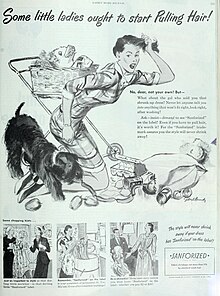Gilbert Bundy

Gilbert Bundy (1911 – November 21, 1955) was an American cartoonist and illustrator, particularly for Esquire, Life, Judge, and The Saturday Evening Post magazines. He killed himself on the 12th anniversary of a deeply traumatic experience as a war artist in the Battle of Tarawa.
Early life and career
[edit]Bundy was born in Centralia, Illinois.[1] His father was a scout for an oil company, so they lived in several oil boom towns across Oklahoma, with Bundy finishing high school in Winfield, Kansas.[1][2]
Bundy's career started in Kansas City, working for an engraving company, and then he moved to New York City in 1929, to draw cartoons for Life and Judge magazines.[1][2] Bundy's "stylish character studies helped establish Esquire magazine", which began publishing in 1933.[3] According to Martin Plimmer, "Bundy's work was painstakingly researched, the result of numerous life studies, the final version being drawn from memory to add spontaneity."[3]
Second World War
[edit]In the Second World War, Bundy was a volunteer war artist in the South Pacific, working for Hearst newspapers and King Features Syndicate.[2][4]
On November 21, 1943, Bundy was on a small landing craft during the amphibious landing in the Battle of Tarawa, when a Japanese shell exploded, leaving him trapped under four dead Marines.[4] The wrecked craft drifted onto a coral reef that was within range of Japanese gunners on the island, so Bundy had to hide beneath the bodies for the remainder of a long day, as enemy bullets and shells hit the craft or landed nearby.[4] Once night fell, he swam away through shark-infested waters, and as Hearst newspapers reported, "He was believed dead for three days. His reappearance startled his Marine mates."[4]
Bundy was sent home to the US to recuperate, and returned to painting illustrations for "light-hearted romantic stories" for The Saturday Evening Post and other magazines, but he "remained haunted by his wartime experience."[4]
Death
[edit]On November 21, 1955, on the anniversary of his Tarawa trauma, he killed himself in his apartment in New York City's Hotel Le Marquis; "his body was found hanging by several neckties from a door hinge", and police determined it was a suicide.[2][4][5][6]
References
[edit]- ^ a b c "Gilbert Bundy". The Society of Illustrators. Retrieved September 18, 2022.
- ^ a b c d Duke, Sara W. (2012). Biographical sketches of cartoonists & illustrators in the Swann Collection of the Library of Congress (First ed.). Arlington, VA. p. 43. ISBN 9781304858887. Retrieved September 18, 2022.
{{cite book}}: CS1 maint: location missing publisher (link) - ^ a b Plimmer, Martin (January 16, 1999). "Classic Cartoons: Martin Plimmer on Gilbert Bundy". The Independent. Retrieved September 26, 2022.
- ^ a b c d e f "The Art of the Post: The Saddest Cover". Saturday Evening Post. Retrieved September 25, 2022.
- ^ "Gilbert Bundy Hangs Self in Hotel Room". Ledger-Enquirer. Columbus, Georgia. November 22, 1955. Retrieved September 19, 2022.
- ^ "Hotel Le Marquis New York City". Avery Architectural & Fine Arts Library. Retrieved September 19, 2022.
